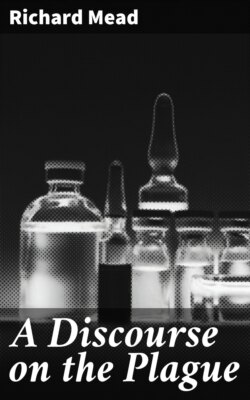A Discourse on the Plague

Реклама. ООО «ЛитРес», ИНН: 7719571260.
Оглавление
Richard Mead. A Discourse on the Plague
A Discourse on the Plague
Table of Contents
PART I
Of the Plague in general
CHAP. I
Of the Origine and Nature of the Plague
CHAP. II
Of the Causes which spread the Plague
PART II
Of the Methods to be taken against the Plague
CHAP. I
Of preventing Infection from other Countries
CHAP. II
Of Stopping the Progress of the Plague, if it should enter our Country
CHAP. III
Of the Cure of the Plague
Отрывок из книги
Richard Mead
Published by Good Press, 2019
.....
On the other hand, I would not be understood to call every Fever a Plague, which is followed by Eruptions resembling these here mentioned: For as every Boil or Pustule, which breaks out upon the Skin, is not an Indication of the Small Pox, nor every Swelling in the Groin a Venereal Bubo; so there are Carbuncles not Pestilential, and other Fevers, besides the Plague, which have their Crisis by Tumors and Abscesses, and that sometimes even in the Parotid or other Glands. There is indeed usually some difference between these Swellings in the Plague, and in other Fevers, especially in the time of their coming out: for in the Plague they discover themselves sooner than in most other Cases. But the principal difference between these Diseases, is, that the Plague is infectious, the other not; at least not to any considerable Degree.
And this leads me to another Character of this Disease, whereby it is distinguished from ordinary Fevers, which is the Contagion accompanying it. This is a very ancient Observation. Thucydides makes it a part of his Description of the Plague at Athens[19]; and Lucretius, who has almost translated this Description of Thucydides, dwells much upon it[20]. Aristotle makes it one of his[21] Problems, How the Plague infects those who approach to the Sick. And what is of more Consequence, Galen himself is very clear in it[22]; for he has these words: ὅτι συνδιατρίβειν τοῖς λοιμώττουσιν ἐπισφαλὲς, ἀπολαῦσαι γὰρ κίνδυνος, ὥσπερ ψώρας τινὸς, &c. that it is unsafe to be about those, who have the Plague, for fear of catching it, as in the Itch, &c. Indeed this is a thing so evident, that we find it at present the current Opinion of all Mankind, a very few Persons only excepted, who have distinguished themselves by their Singularity in maintaining the opposite Sentiment. And it is something strange that any one should make a Question of a thing so obvious, which is proved sufficiently by one Property only of the Disease, that whenever it seizes one Person in a House, it immediately after attacks the greatest part of the Family. This Effect of the Plague has been so remarkable at all times, that whoever considers it well, cannot possibly, I think, have any Doubt remaining, or require any stronger Argument to convince him, that the Disease is infectious. For this very reason the Small-Pox and Measles are generally allowed to be contagious; because it is observed, that when either of these Diseases is got among a Family, it usually seizes successively the greatest part of that Family, who have not had it before: at least if such in the Family hold free Communication with the Sick. And by the same Argument the Plague must be concluded to be infectious likewise. It cannot be pretended, that this is occasioned in the Plague from this only, that the sound Persons are render’d more than ordinarily obnoxious to the unhealthy Air, or whatever be the common Cause of the Disease, by being put into fear and dispirited, upon seeing others in the same House taken sick: For if this were the Case, Children, who are too young to have any Apprehensions upon this Account, would escape better than others, the contrary of which has been always experienced.
.....